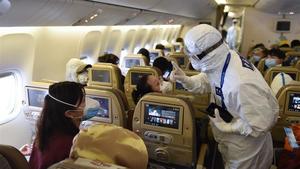 A customs officer answers questions for inbound passengers on a flight at the Capital International Airport in Beijing, capital of China, March 18, 2020. (CHEN ZHONGHAO / XINHUA)
A customs officer answers questions for inbound passengers on a flight at the Capital International Airport in Beijing, capital of China, March 18, 2020. (CHEN ZHONGHAO / XINHUA)
China's aviation regulator said on Monday it will arrange additional or chartered flights to bring back its citizens stuck abroad due to the novel coronavirus pandemic, based on the demands of overseas Chinese and domestic local governments' capacity to handle inbound passengers.
The number of international flights in and out of China plummeted after the Civil Aviation Administration rolled out measures to curb the flow of travelers across the border and curtail the spread of the virus. These policies include requiring domestic and foreign airlines to drastically reduce international routes, slashing the number of flights per week and capping the passenger load on each flight at under 75 percent.
We will activate the mechanism for significant air transport missions based on the demands of overseas Chinese and domestic regional capacity to handle them. Chinese airlines are also capable of sending additional or chartered planes in a timely manner.
Jin Junhao, an official with the Civil Aviation Administration, China
"The restrictions on international flightsare meant to guard against the worsening epidemic situation overseas, but we've also noticed that some overseas Chinese citizens have valid demands to return to China," Jin Junhao, an official with the administration's transport department, said at a news conference.
ALSO READ: Citizens stuck abroad to receive more help
He said the number of scheduled international flights nationwide is expected to drop to 108 this week, down from 734 for the previous week and only 1.2 percent of the weekly volume before the pandemic.
Beijing, Shanghai and Guangzhou, Guangdong province-the three largest aviation hubs on the Chinese mainland-will operate 61 international flights this week, down by 89 percent from the week before. The daily number of incoming air travelers will also go down from 25,000 to 4,000 for the same period, officials said.
Jin said the abrupt drop in air travel has affected the overseas Chinese community, especially Chinese teenagers and young adults who study abroad.
"We will activate the mechanism for significant air transport missions based on the demands of overseas Chinese and domestic regional capacity to handle them. Chinese airlines are also capable of sending additional or chartered planes in a timely manner," he said.
In another attempt to stem imported infections, China has recently decided to redirect incoming international flights to Beijing to land at one of 12 designated airports in other cities, where all passengers will go through strict quarantine and screening. Only those who are deemed as being at no risk of spreading the virus will be allowed to travel to the capital.
Jin said as of Sunday, a total of 100 flights involving 23,157 passengers bound for Beijing have been diverted. About 83 percent of passengers-those who didn't pass tests or were in proximity to those passengers-were held locally at those first stops for treatment or quarantine.
READ MORE: Beijing airport screenings upgraded
The number of imported infections on the Chinese mainland rose by 30 to 723 on Sunday, according to the National Health Commission.
Liu Haitao, head of the Border Inspection Management Department of the National Immigration Administration, said it's necessary and responsible for people to cancel nonessential cross-border travel.
The administration, along with the Ministry of Foreign Affairs, announced last week that foreigners, including those with residence permits and valid visas, would be prevented from entering China starting on Saturday. Diplomatic officials and foreigners "engaging in necessary economic, trade, scientific or technological activities, and emergency humanitarian cause" are exempt.
Liu added on Monday that foreign citizens who come to China for cooperation on anti-epidemic efforts are also exempt. "Foreigners who fulfill these exemptions can apply for a new visa to Chinese embassies and consulates," he said.
Contact the writers at wangxiaoyu@chinadaily.com.cn


